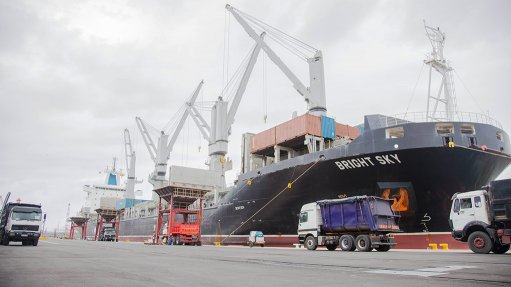Public sector capacity building vital in countering chronic underspending
The Department of Public Works and Infrastructure (DPWI) has, through its entity the Construction Industry Development Board (CIDB), prioritised building capacity in the public sector to deliver infrastructure “better and with greater urgency and efficiency”, says Public Works and Infrastructure Minister Patricia de Lille.
She says government spent 70.6% of its total allocated infrastructure budget in 2019/20, with this figure improving “mildly” by 2020/21 to 73%.
“Government recognises the importance of construction as an ideal catalyst for economic growth and social development, and a key creator of work opportunities particularly for the emerging [construction] sector, which is one of the main generators of employment in the country,” says De Lille.
“Every cent that goes back to the national coffers in unspent infrastructure budgets is an opportunity lost to the emerging sector and a threat to [its] survival and sustainability.”
More than 150 000 emerging enterprises are registered on the CIDB Register of Contractors.
By capacitating public sector clients to deliver infrastructure, the DPWI, through the CIDB, aims to curb government underspending to increase its contribution to growing this sector, and to improve the construction industry’s potential to catalyse the country’s economic growth, note the DPWI and CIDB in a joint statement.
Government is a key player in the construction sector, accounting for about 40% of the country’s total infrastructure budget.
Around R117.5-billion was allocated to infrastructure in the 2022/23 financial year, and it is estimated that government expenditure will total R903-billion over the next three years.
“Given the importance of the construction sector, public sector infrastructure clients must increase expenditure on allocated budgets and deliver the infrastructure that is so desperately needed to stimulate economic growth and support the country’s service delivery needs,” says the joint statement.
“In order to increase the rate of government expenditure on budgets and to improve performance within the public sector, the CIDB has held capacitation training for at least 163 public sector clients across all three spheres of government in the 2021/22 financial year to impart critical skills, particularly planning and procuring for infrastructure, which is an Achilles heel of infrastructure delivery in government,” says CIDB CEO Bongani Dladla.
This included the training of officials in 15 national and 45 provincial departments, 44 local governments, 8 metropolitan municipalities and 40 State-owned entities including Eskom, Transnet, and Airports Company South Africa.
The target audience included supply-chain management practitioners, technical departments, CFOs and legal departments.
In the current financial year, the CIDB has already completed 52 capacitation training sessions.
At the centre of the training is the need to improve public sector compliance to the CIDB Standard for Uniformity in Procurement of Engineering and Construction Services, which establishes best practices for construction procurement and standardises documentation, systems and practices.
Poor retention of skills owing to the movement of key personnel out of government and within departments and institutions is one of the key factors affecting the effective delivery of infrastructure, which necessitates ongoing capacitation by the CIDB, says the joint statement.
Comments
Press Office
Announcements
What's On
Subscribe to improve your user experience...
Option 1 (equivalent of R125 a month):
Receive a weekly copy of Creamer Media's Engineering News & Mining Weekly magazine
(print copy for those in South Africa and e-magazine for those outside of South Africa)
Receive daily email newsletters
Access to full search results
Access archive of magazine back copies
Access to Projects in Progress
Access to ONE Research Report of your choice in PDF format
Option 2 (equivalent of R375 a month):
All benefits from Option 1
PLUS
Access to Creamer Media's Research Channel Africa for ALL Research Reports, in PDF format, on various industrial and mining sectors
including Electricity; Water; Energy Transition; Hydrogen; Roads, Rail and Ports; Coal; Gold; Platinum; Battery Metals; etc.
Already a subscriber?
Forgotten your password?
Receive weekly copy of Creamer Media's Engineering News & Mining Weekly magazine (print copy for those in South Africa and e-magazine for those outside of South Africa)
➕
Recieve daily email newsletters
➕
Access to full search results
➕
Access archive of magazine back copies
➕
Access to Projects in Progress
➕
Access to ONE Research Report of your choice in PDF format
RESEARCH CHANNEL AFRICA
R4500 (equivalent of R375 a month)
SUBSCRIBEAll benefits from Option 1
➕
Access to Creamer Media's Research Channel Africa for ALL Research Reports on various industrial and mining sectors, in PDF format, including on:
Electricity
➕
Water
➕
Energy Transition
➕
Hydrogen
➕
Roads, Rail and Ports
➕
Coal
➕
Gold
➕
Platinum
➕
Battery Metals
➕
etc.
Receive all benefits from Option 1 or Option 2 delivered to numerous people at your company
➕
Multiple User names and Passwords for simultaneous log-ins
➕
Intranet integration access to all in your organisation





















